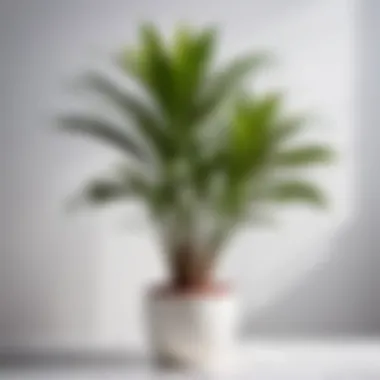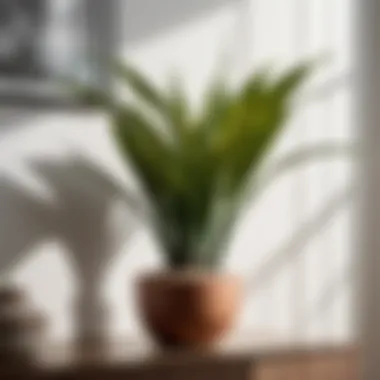Discover the Top Easiest Large Indoor Plants for Effortless Care


Materials:
- Large indoor plant of choice (e.g., Fiddle Leaf Fig)
- Pot with drainage holes, 12 inches in diameter
- High-quality potting soil
- Watering can
- Pruning shears
DIY Steps:
- Begin by selecting a large indoor plant suited for your space and lifestyle, such as the resilient and visually appealing Fiddle Leaf Fig.
- Choose a spacious pot with drainage holes to ensure proper water drainage, measuring at least 12 inches in diameter for optimal plant growth.
- Fill the pot with high-quality potting soil, providing a nutrient-rich environment for your plant to thrive.
- Carefully transplant your chosen large indoor plant into the prepared pot, ensuring the roots are well-covered with soil.
- Water the plant thoroughly but make sure not to overwater, aiming for moist but not soggy soil.
- Prune any dead or overgrown branches with sharp pruning shears to promote healthy growth and maintain the plant's aesthetics.
Technical Aspects:
- Tools required: Watering can, pruning shears
- Timing specifics: Water the plant once a week or adjust based on plant needs; prune every few months as required
- Critical techniques: Proper watering techniques to prevent root rot, regular pruning for plant health
DIY Project Process:
- Start by planning and researching the specific care requirements of your chosen large indoor plant to ensure its long-term health and growth.
- Follow the step-by-step instructions provided above for transplanting the plant and maintaining its overall well-being.
- Utilize troubleshooting tips like adjusting watering frequency or pruning techniques if any issues arise during the plant's care.
- Enjoy the result of your efforts as your large indoor plant flourishes and becomes a beautiful focal point in your indoor space.
Introduction
In the realm of indoor gardening, the choice of large indoor plants adds a touch of elegance and tranquility to living spaces. This article serves as a beacon of knowledge for individuals venturing into the world of indoor plant care, specifically focusing on the easiest large indoor plants to nurture. The significance of this topic lies in providing housewives and homeowners with practical and aesthetically pleasing options that demand minimal upkeep while enhancing the indoor environment's beauty.


When considering the ambiance of a living space, large indoor plants hold the power to transform a room into a verdant sanctuary, promoting relaxation and clean air. The allure of these botanical wonders is not merely in their visual appeal but also in their air-purifying qualities, contributing to a healthier indoor ecosystem. Understanding the unique benefits and considerations around caring for large indoor plants is crucial in ensuring their longevity and vitality within a home setting.
Housewives invested in creating a cozy and welcoming atmosphere will find solace in the ease of maintenance offered by the selected large indoor plants. Likewise, homeowners seeking to elevate the aesthetic appeal of their interiors without compromising on convenience will appreciate the practical insights shared in this article. By delving into the specifics of each plant's care requirements and characteristics, individuals can embark on a journey of green companionship within their living spaces.
This piece serves as a comprehensive guide for novice and seasoned plant enthusiasts alike, unveiling the charm and simplicity of nurturing large indoor plants. From enhancing indoor air quality to adding a natural touch to home décor, these plants offer a myriad of benefits that resonate with individuals seeking a harmonious blend of nature and modern living. Dive into the realm of easy-to-care-for large indoor plants and unlock the joys of botanical companionship within your home.
Benefits of Large Indoor Plants
Indoor plants provide a range of benefits beyond just aesthetics. In this article, we delve deep into the significance of having large indoor plants in your living or working space. Large indoor plants not only enhance the visual appeal of an area but also improve air quality by absorbing toxins and producing oxygen. They can act as natural humidifiers, creating a healthier environment with optimal moisture levels. Additionally, these plants have been shown to reduce stress and boost productivity, making them an excellent addition to homes and offices. Moreover, large indoor plants can serve as natural focal points, adding character and depth to any room they inhabit. They also promote a sense of well-being and connection to nature, which is particularly beneficial in urban settings where greenery may be limited. When choosing large indoor plants, it is essential to consider their benefits beyond aesthetics, as they can positively impact both physical and mental health. By including large indoor plants in your indoor spaces, you are not only beautifying your surroundings but also creating a healthier and more vibrant living environment.
Factors to Consider When Choosing Large Indoor Plants
When selecting large indoor plants for your living spaces, it is crucial to consider several factors to ensure they thrive and enhance the aesthetics of your home. Each plant has unique requirements, and understanding these factors can make a significant difference in their growth and overall health.
Light Requirements
Light is an essential element for the proper growth of indoor plants. Different plants have varying light preferences, such as direct sunlight, indirect sunlight, or low light conditions. It is vital to place your plants in locations that match their specific light needs to promote healthy development. Consider factors like the direction of windows and the intensity of sunlight in different areas of your home when choosing the right plants.
Watering Needs


Watering plays a crucial role in the care of large indoor plants. Overwatering or underwatering can have detrimental effects on plant health. Understanding the specific watering needs of each plant is vital to prevent issues like root rot or dehydration. Some plants prefer frequent watering, while others thrive with minimal moisture. Factors like the plant's size, type of soil, and humidity levels in your home should all be considered when establishing a watering routine.
Maintenance Level
The maintenance level of large indoor plants varies, with some requiring more attention and care than others. Consider your lifestyle and availability to care for your plants when selecting low-maintenance options. Plants like the Snake Plant and ZZ Plant are excellent choices for individuals with busy schedules, as they require minimal upkeep and can thrive in various conditions. On the other hand, plants like the Peace Lily may need more consistent care and attention. Understanding the maintenance requirements of each plant upfront can help you make an informed decision based on your capabilities and preferences.
Top Picks for Easy-to-Care-For Large Indoor Plants
In this section, we delve into the top picks for easy-to-care-for large indoor plants, crucial for those seeking low-maintenance and visually appealing plant options. These plants not only add a touch of green to spaces but also require minimal effort to thrive, making them ideal choices for busy individuals or those new to plant care.
Peace Lily
Light: Indirect sunlight
Indirect sunlight plays a vital role in the growth of Peace Lilies. This specific aspect ensures that the plant receives sufficient light without being exposed to direct harsh sun rays, which could cause damage. The indirect sunlight requirement of Peace Lilies contributes to their adaptability to various indoor environments, making them a popular choice for individuals looking for plants that can thrive in low-light conditions. Despite its low light needs, Peace Lilies still manage to offer stunning blooms, adding aesthetic value to indoor spaces.
Watering: Weekly
The weekly watering schedule of Peace Lilies is key to their well-being. By providing consistent moisture without overwatering, this routine ensures the plants stay healthy and vibrant. While they can tolerate occasional drying out between watering sessions, a weekly watering routine allows for optimal growth and blooming. Understanding the watering needs of Peace Lilies enhances their resilience and longevity, making them a top choice for those seeking easy to manage indoor plants.


Care: Low maintenance
The low maintenance care required by Peace Lilies makes them a sought-after plant for indoor settings. Their ability to thrive with minimal intervention, such as occasional pruning and fertilizing, appeals to individuals looking for hassle-free plant care. Peace Lilies are forgiving plants that can withstand occasional neglect, making them an excellent choice for beginners or busy plant enthusiasts seeking a touch of nature in their homes.
Tips for Caring for Large Indoor Plants
In this article exploring the easiest large indoor plants to care for, understanding and implementing proper care techniques is vital to ensure the health and longevity of your green companions. Tips for caring for large indoor plants encompass various aspects that contribute to their overall well-being, from watering practices to grooming routines. By delving into the specifics of each care element, you can optimize the environment for your plants and enjoy their beauty to the fullest.
Proper Watering Techniques
Proper watering techniques are fundamental in maintaining the health of large indoor plants. Overwatering can lead to root rot, while underwatering can cause wilting and nutrient deficiencies. Finding the right balance is key to establishing a thriving environment for your plants. Factors such as the type of plant, season, potting medium, and environmental conditions all play a role in determining the watering frequency. It is essential to water your plants thoroughly, allowing excess water to drain away and prevent waterlogging. Regularly check the moisture levels in the soil to ensure consistency and adjust your watering schedule accordingly.
Pruning and Grooming
Pruning and grooming are essential practices to promote growth and maintain the aesthetics of large indoor plants. Removing dead or yellowing leaves, trimming overgrown stems, and shaping the plant not only enhance its visual appeal but also encourage new growth. Pruning helps eliminate diseased or damaged parts, reducing the risk of infection and pest infestation. It is advisable to use clean, sharp tools to make precise cuts and minimize stress on the plant. Regular grooming sessions also provide an opportunity to inspect your plant for any signs of distress or abnormalities, allowing proactive measures to be taken promptly.
Monitoring Light Exposure
Light exposure plays a crucial role in the photosynthetic process and overall plant health. Monitoring the amount and intensity of light that your large indoor plants receive is essential for their growth and development. Different plants have varying light requirements, with some preferring bright, indirect light, while others thrive in low-light conditions. Positioning your plants near windows or supplemental light sources can help meet their specific needs. Regularly rotate your plants to ensure uniform light distribution on all sides and prevent uneven growth patterns. Observing and adjusting light exposure based on seasonal changes and plant response is key to maintaining vibrant and thriving indoor greenery.
Conclusion
In dissecting the realm of large indoor plants, we unravel a world where nature elegantly merges with interior decor, presenting a fusion of aesthetic appeal and practicality in daily living. The conclusion of this discourse underscores the pivotal significance of thoughtful selection and dedicated care in fostering lush greenery within indoor spaces. By meticulously considering factors such as light requirements, watering needs, and maintenance levels, homeowners can curate a harmonious botanical environment that thrives effortlessly.
Delving deeper, the essence of the conclusion lies in the transformative power of integrating these easy-to-care-for plants into one's living spaces. Not merely as decorative elements, but as living companions that purify air, reduce stress, and enhance overall well-being. The reassurance of low maintenance demanded by these plant varieties assures a seamless integration into busy lifestyles, offering a touch of nature's tranquility without the anxiety of high upkeep.
Furthermore, the journey from selection to nurturing of these large indoor plants unveils a pathway to sustainable living within the confines of modern dwellings. As we embrace the minimalistic joy of tending to these resilient plants, we cultivate a deeper connection to the natural world, fostering a mindful appreciation for the vibrant energy they bring into our homes.







